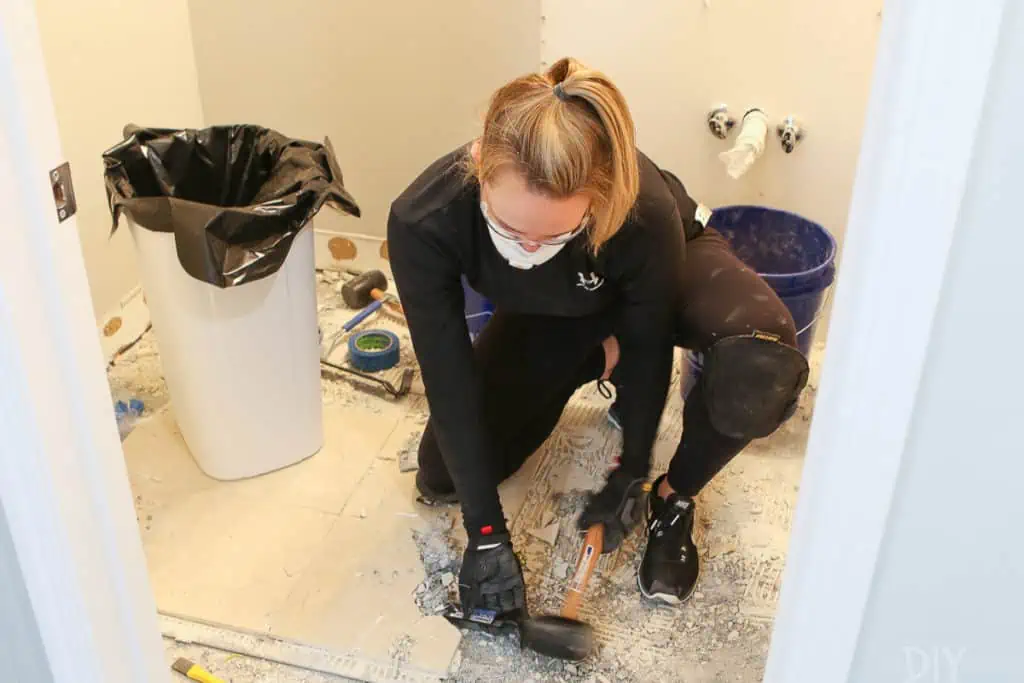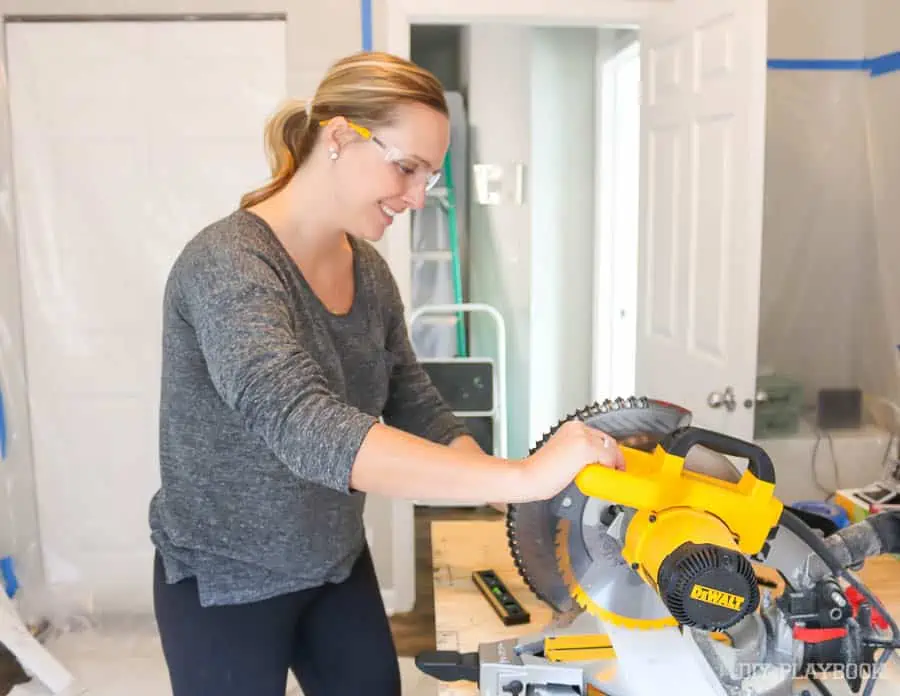As two girls who are constantly improving our homes, we’ve completed our fair share of DIY projects.
And in case you were wondering, most home improvement projects come with a fair amount of noise.
While this can obviously be disruptive to the people in your own home, it can be especially disruptive to your neighbors.
Luckily, because DIY projects are sort of our thing, we have some tried and true ways to tackle home improvement projects without making our neighbors hate us. We’ll discuss how these tips vary depending on your living situation, with one of us living in a condo building in the city, the other in a single-family home in the suburbs.
Home Improvement Projects in a Condo Building
I, Casey, live in a five-unit building in the heart of Chicago—and I’m super lucky. Why? Because I absolutely love all of my neighbors.
They all know about my passion for DIY and have come to embrace the noise that erupts from our unit every weekend or so.
However, the reason they love me in spite of that fact is because I’ve taken lots of the following measures to be as respectful as possible to everyone living under the same roof as me, especially with any of my large-scale projects.
Read Your Home Owners Association (HOA) Rules
Every HOA comes with its own rules. You should definitely give that little handbook a read before you start any projects.
Take note of what projects are allowed (sometimes you’re not allowed to make updates on the exterior of your unit/building for instance), what permits are required, and the times when construction can take place. Being up to date on the rules will come in handy when you tackle the next item on this list…
5 Sweet Garage Upgrades That Up Your Home’s Value
Garage additions and upgrades like the five in this list can produce an estimated 65 percent return-on-investment.
Discuss Your Project At Your Next Building Meeting
In our building, we get together every few months to discuss finances, building issues, and other random items that pop up. Most condo buildings do this. Before my husband and I renovated our guest bathroom, we brought up our plan at our condo association meeting.
This was months before we were set to begin our project, but we wanted to get it on everyone’s radar and address any concerns ahead of time.
It ended up working out wonderfully because not only were our neighbors supportive, but we were able to gain insight on a few contractors our neighbors had used in their own homes!
At these meetings, it’s also important to give everyone your contact information so they can text or email you if things get too noisy or out of hand.
Giving your neighbors the go ahead to reach out at any point can potentially save you from headaches when the project begins. No one wants an angry neighbor pounding on their door!
Have a Plan for Extra Trash
In our building, we pay to have our trash and recycling hauled away each week. If our cans are overflowing, we face some extra charges and fines. When you’re gutting a space, you’re bound to have lots of trash, so make a plan to discard all of it.
Our plan was that we were able to pay our contractor to haul away all of the debris. This worked out perfectly because it didn’t hog up valuable space in our building’s crowded dumpster. Make a plan of attack before you start and let your neighbors know that you have things under control!
Always Keep Hallways and Common Areas Clean
Home improvement projects bring loads of dust and dirt into your home. And sometimes? The mess can spill into the hallway and common areas of your building. Be respectful. Keep those spaces as clean as possible. After a long day of DIY, don’t just clean up your own home, tackle those communal hallways too.
After we renovated our bathroom, I made sure to do a deep clean of the hallways and front of our building when the project was 100% finished. My neighbors appreciated it and I felt good knowing that our property was neat and tidy even after such a large construction project.
Stick to a Schedule
Your HOA may have specific rules on when you can do construction work. Ours didn’t have set hours, but we never started a project before 8 a.m. and tried to always finish by 7 p.m.
If we were up early and wanted to get moving, we would only do quiet tasks (getting out tools, taping walls, etc.) and we kept the loud tasks (like using the wet saw to cut tile!) to mid-day.
It’s also important to keep your neighbors in the loop when it comes to the timeline of your project. We thought our bathroom renovation would take four weeks, but it somehow extended into seven weeks. I emailed our neighbors a few times throughout the process to let them know that things were being pushed back and addressed any concerns. The new deadline ended up being a non-issue and I really believe it was because we were so open with our neighbors throughout the process.
Always Say Thank You
When we (finally!) completed our bathroom project, we left handwritten thank you notes on everyone’s front doors. We even went the extra mile and put coffee gift cards into each one. This was a simple way to say thanks for putting up with all of our noise and our neighbors really appreciated the gesture!
Home Improvement Projects in a Single-Family Home
While Casey lives in a condo in the city, I navigate these same noisy projects a little differently inside a single-family home located in the suburbs. Some of her tips are still helpful to consider, but the rules are slightly different for neighborly etiquette when you’re not living in such close quarters.
Physically Go Talk to Your Nearby Neighbors
Sounds simple enough, but it’s critically important to talk to your neighbors well in advance! Discussing your plans will avoid them feeling off-guard one the project (and noise) starts.
You also don’t want to cause alarm if they start seeing foreign vehicles from contractors or workers parked outside of your home while you’re away at work. Getting them in-the-know before the project starts will actually be to your advantage. Heck, get on their good side and maybe they could field a delivery if you’re running late or let a worker inside if needed. Neighbors want to help – in most cases – especially when they know what’s going on.
Secure a City Permit
Securing a permit, if your city/village requires one, is essential before starting any large-scale projects. (And this will protect you just in case a problem arises from one of your neighbors.) If they are unhappy about the noise, or dumpster placement, or anything else, and then they take action to report you, not having a permit will be a bigger problem than your neighbor’s complaints.
Start Inside Early and Move Outside Later
There have been plenty of times when we are knee-deep in a DIY project that we get up super early to continue. But, truly, saws are very noisy, so we typically wait for that step until it’s appropriate, or we take the time to get everything set up early (even if it is outside) and don’t cut until late in the morning.
Don’t waste time waiting for your neighbors to get up, but don’t go about your business waking them up either!
Let Your Neighbors Follow the Progress
An easy way to keep neighbors in the loop is to invite them in a time or two throughout the process to share your progress! Show them what you’re working on and how excited you are for the progress. Including your neighbors helps them feel special and they will be less inclined to be annoyed if things do get a little noisy or messy.
Overcommunicate
Overcommunicating is always a good idea to avoid confrontation. Don’t be afraid to let your neighbor know when the dumpster is scheduled to get picked up, any problems that may impact your deadline, when a large delivery is expected, etc. The more they know in advance on some of these larger “issues”, the fewer problems will arise. Use Nextdoor. Communicate, communicate and overcommunicate.
Keep Your Contractor up to Date Often
This overcommunication should also be applied to your contractors. Be sure to share with them your expectations on start times, end times, and any other issues that may impact the neighborhood. Don’t go to your contractor only after you’ve heard complaints or it’s become a full-blown problem. Being proactive and communicating your expectations in advance will hopefully help avoid any issues in your neighborhood.
Celebrate Together!
Now it’s time for the fun part! Once your noisy project is over, don’t be afraid to invite some of the neighbors over to check out the new space and enjoy a few cocktails while they’re there. We just had a large landscaping renovation happen that made our streets, sidewalks and overall curb appeal a huge mess for several weeks.
Once our patio was paved and the mess was cleared, we invited our neighbors over to enjoy the new space with some food, but most importantly, to thank them for their patience.
They were all so grateful and gracious, which gives me a lot more confidence to tackle another noisy project soon. Knowing I have their support makes the process a whole lot less stressful!
We hope these steps help you tackle your next noisy home improvement project while still keeping the peace. We’re no Mr. Rogers, but we’re confident you can tackle those DIY projects and still make it a beautiful day in the neighborhood for your neighbors.











